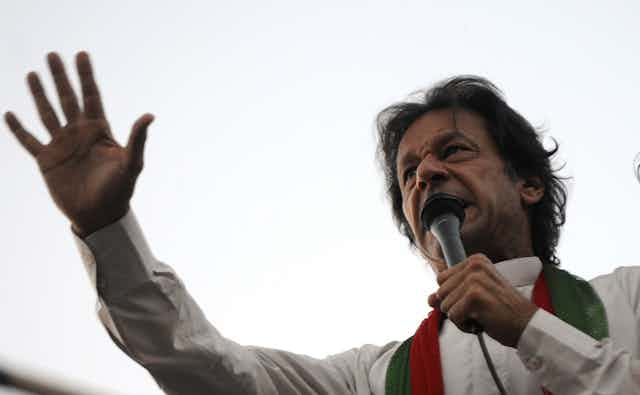Imran Khan, the prime minister of Pakistan, has caused an uproar with remarks about sexual violence, attributing the rising number of reports of rape in Pakistan to “vulgarity” and the way women dress. His words prompted outrage among women’s groups, who are advocating for greater equality in a nation which recently ranked 153rd out of 156 countries for gender parity in the Global Gender Gap report by the World Economic Forum and seventh out of the eight countries in the south Asian region.
To understand Khan’s comments we have to look at them in the context of internal and international politics. On sexual violence, the report discloses that 85% women in Pakistan have experienced “intimate partner violence”. The figures reinforce the reality that sexual violence happens inside homes, as much as, if not more than, outside. But familial power structures are such that perpetrators often remain unpunished despite changes to the law.
More specifically, the statistics draw attention to women’s exclusions from education, income and ownership of land. Despite his recent comments, which have drawn criticism for victim-blaming, Khan has introduced new legislation in response to two prominent cases reported extensively in the media. The rape and murder of six-year-old Zainab Ansari in Kasur in 2018 and the Lahore motorway gang rape of a woman in front of her children in 2020 caused an outpouring of public anger, grief and outrage. There were also concerns over what appeared to be prejudicial attitudes towards women on the part of the police.
Pakistan’s parliament reacted with a law imposing a penalty of life imprisonment for child abuse and an anti-rape law establishing a sex offender’s register in Pakistan for the first time and imposing chemical castration on serial offenders.
Looking east
But Khan’s commentary on women’s dress and the modesty of purdah (the practice of keeping women in seclusion) has reignited a debate over westernisation in the Islamic republic. In the current global climate, as alliances are shifting, there is a rising anti-western sentiment and many feel Pakistan needs to break free from an over-reliance on the International Monetary Fund by continuing to move closer to China and the Middle East through the Belt and Road Initiative (BRI) and foreign remittances.
Pakistan is a key part of the China-driven BRI – referred to as a 21st-century Silk road that will transform global power across Asia, Africa and Europe. As the west becomes more antagonistic toward China, Pakistan has drawn closer to its biggest benefactor in terms of infrastructure development. This is also reflected in the global vaccination programme – Pakistan has sourced vaccines from China and Russia (as well as from the UK-Swedish firm AstraZeneca).
Khan is also an admirer of Turkey’s president, Recep Tayyip Erdoğan, and shares his critique of a secular west that they view as insensitive to Muslims.

As part of his cultural strategy, Khan has imported the blockbuster Turkish drama series Diriliş: Ertuğrul into Pakistan to inculcate a love of Islamic history and heroes in a bid to move away from a Hollywood/Bollywood culture of films.
Previously Khan has noted that family is the backbone of Pakistani society and the one advantage that Pakistan has as an Eastern nation. He blames the breakdown of family and societal values on westernisation and immoral media content.
His identification of women as representatives of an eastern authenticity chimes with the view of Pakistan’s conservative right-wing and is a strategy that has been used by Islamist parties to reject modernity.
Women on the march
Meanwhile, the activist-led Aurat Women’s March campaign advocating for women’s rights in Pakistan has sent out a consistent and unwavering protest message since 2018. Using the slogan “mera jism, meri marzi” (my body, my choice) the campaign aims to encourage women to take ownership of their bodies and culminates in a march on International Women’s Day (March 8).

These slogans have upset those with orthodox views leading to death threats, surveillance and trolling. Activists are seen as a secular problem by the religious right and the demand for women’s rights is often associated with a western-style modernity. This year further controversy over the marchers was ignited over social media through an alleged blasphemy charge refuted by the organisers.
The protesters have come together to speak out against sexual violence and harassment in everyday life, which has increased as women’s share of the urban workforce has significantly gone up. Their activism speaks to a new wave of feminism in Pakistan demanding structural change and inclusivity in a gendered struggle against misogyny.
Thus disagreements over dress and language deflect attention from the real cause of sexual violence: shame and familial power working in tandem with caste and class hierarchies that normalise sexual violence.
Khan’s populism
Khan’s commentary has once again shown the populist leadership style he relies on to garner voter acceptability and appease the right. By linking purdah and sexual violence he is able to reinforce stereotypical representations of eastern women as women who should be pious and purdah observant in contrast to westernised women.
His deliberate anti-feminist stance projects purdah as the glue that binds Pakistani society. The question that remains is, how does Khan plan to change the future of women and girls and build gender parity? The Global Gender Gap report estimates that it will take 195.4 years to close the gender gap in South Asia. Imran Khan will need a strategy beyond enforcing women’s purdah to solve the crisis of sexual violence and gender parity.

